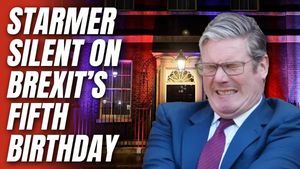H&M is on a mission to strengthen its foothold in the fast-fashion market, acknowledging the intense competition it faces from rivals like Zara and Shein. CEO Daniel Erver has asserted the need for the Swedish retailer to improve product quality and trendiness rather than solely competing on price. "Just competing on lowest price will not cut it for us, we need to step up and raise the bar," Erver told Reuters, capturing the essence of the company's strategy as it struggles to regain lost market share.
H&M's recent financial performance has been underwhelming, with fourth-quarter sales missing expectations. To combat this, Erver's strategy includes significant investments in marketing directed at fashion-conscious younger consumers. This involves collaborations with pop stars, including Charli XCX, and partnerships with social media influencers to boost brand loyalty and visibility amid rising awareness of fast-fashion alternatives.
"To start accelerating the work of gaining market share and ... positioning ourselves, it's been really important to win the fashion-interested female customer, especially the young generation, because she will shape the industry for the future," Erver said. This commitment indicates H&M's pivot to attract younger demographics, especially as online-only competitors like Shein continue to undercut prices.
One of the ways H&M aims to differentiate itself is by enhancing its product offerings, focusing on delivering value for money through improved collections. Erver noted improvements to the product mix contributed to a higher operating profit margin for the fourth quarter, even if overall sales were disappointing.
Simultaneously, H&M is making operational changes intended to streamline its supply chain and product development process. The company’s chief financial officer revealed these alterations could potentially cut the time from product conception to store arrival by as much as 50%. Such improvements signal H&M's determination to react more swiftly to fashion trends and consumer demands.
Beyond these strategic shifts, H&M is also updating its customer policies, including introducing new fees for online returns aimed at improving profitability. Starting on February 3, 2025, customers will face a £2.95 return fee for online orders—a jump from the previous £1.99. Even loyalty members, who once enjoyed free returns, will now need to adapt to this additional charge.
The change has sparked public commentary, with some shoppers expressing frustration over the decision. H&M clarified its stance, stating: "Returns are currently free for all H&M Members but starting from the 3rd of February, a return fee of £2.95 will be deducted from your refund for all customers." H&M assures customers they won't be charged for faulty items or returns made directly to stores, emphasizing the fee applies only to online returns.
H&M's extended return policy allows shoppers to return items within 28 days of purchase, incentivizing customers to keep purchasing with the added comfort of knowing they can easily return unwanted items. The retailer stated: "The fee is not applied to faulty items or returns made to H&M stores." These changes indicate H&M’s strategy to balance customer engagement with necessary financial adjustments.
The opening of new stores under H&M's premium Arket brand marks another strategic development for the company. Store openings are set for Austria, Norway, Greece, and Ireland, targeting consumers who are willing to invest more for curated shopping experiences, which include cafes encouraging shoppers to spend additional time and money.
H&M has committed to continuous investment in elevational marketing campaigns and innovative products. Erver, reflecting on the broader market challenges, concluded, "We need to raise the bar to compete effectively and pave the way for sustainable growth now and for the future." This relentless drive to shift the brand image alongside calculated financial adjustments sets the stage for H&M’s attempts to revitalize its business.



